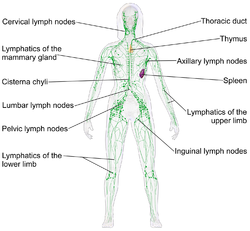
Back Ganglio limfatico AN عقدة لمفاوية Arabic लीम्फ नोड़ AWA Limfa düyünləri Azerbaijani Лімфатычны вузел Byelorussian Лимфен възел Bulgarian লসিকাগ্রন্থি Bengali/Bangla Limfni čvor BS Gangli limfàtic Catalan لیمفەگرێ CKB
| Lymph node | |
|---|---|
 Diagram showing major parts of a lymph node | |
 Lymph nodes form part of the lymphatic system, and are present in most parts of the body, and connected by small lymphatic vessels. | |
| Details | |
| System | Lymphatic system, part of the immune system |
| Identifiers | |
| Latin | nodus lymphaticus (singular); nodi lymphatici (plural) |
| MeSH | D008198 |
| TA98 | A13.2.03.001 |
| TA2 | 5192 |
| FMA | 5034 |
| Anatomical terminology | |
A lymph node, or lymph gland,[1] is a kidney-shaped organ of the lymphatic system and the adaptive immune system. A large number of lymph nodes are linked throughout the body by the lymphatic vessels. They are major sites of lymphocytes that include B and T cells. Lymph nodes are important for the proper functioning of the immune system, acting as filters for foreign particles including cancer cells, but have no detoxification function.
In the lymphatic system, a lymph node is a secondary lymphoid organ. A lymph node is enclosed in a fibrous capsule and is made up of an outer cortex and an inner medulla.
Lymph nodes become inflamed or enlarged in various diseases, which may range from trivial throat infections to life-threatening cancers. The condition of lymph nodes is very important in cancer staging, which decides the treatment to be used and determines the prognosis. Lymphadenopathy refers to glands that are enlarged or swollen. When inflamed or enlarged, lymph nodes can be firm or tender.
- ^ "Swollen glands NHS inform". www.nhsinform.scot. Retrieved 4 April 2020.